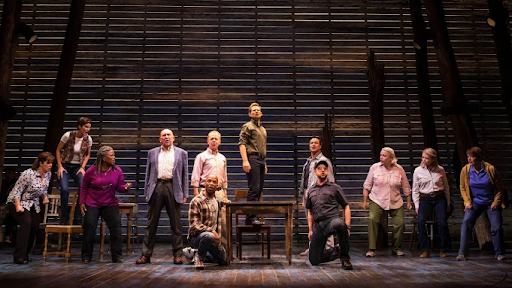The Influence of 9/11 on Media in 20 Years

Image courtesy of The Hollywood Reporter.
By Anna Sheehan
Growing up in the last two decades, today’s college students heard countless stories from adults about September 11, 2001. These stories describe something which changed the world in which we live, but they also remind us that this relatively recent event, which impacted individuals across the nation and the globe, occurred before we entered the world. We didn’t feel the horror, the fear, the anger, and the grief in the same way as those just a few years older than us. Through the stories surrounding 9/11, however, we can come to understand something of this still shocking day in American history. We feel an echo of the mourning that our world still endures.
This year, 2021, is the twentieth anniversary of the terrorist attacks that caused 2,996 deaths in addition to injuries, destroying the Twin Towers in New York City and damaging the Pentagon in Washington, D.C. Over the past twenty years, people around the world have written and read about these calamities. But what perhaps stands out most about the myriad of 9/11 media is that much of it is fictional.
From the novel Falling Man by Don DeLillo to Bruce Springsteen’s song Down in the Hole to the Broadway musical Come From Away, fiction has played a primary role in memorializing the tragedy. “Within a few years, it was clear that 9/11 would leave an impact on contemporary fiction as deep as its impact on every other aspect of our culture,” said Ron Charles in a Washington Post article.
In recognition of the twentieth anniversary, multiple websites published lists of recommended books of both fiction and nonfiction about 9/11. The Washington Post, The New York Times, and Barnes & Noble all compiled lists of recommended reading. These lists include reviews of the literature and reflections on the role of fiction in how people responded to 9/11. An entire book has been written on 9/11 media itself: Martin Randall wrote 9/11 and the Literature of Terror around the tenth anniversary. Randall described that fiction rather than barebones facts fits the deepening of our perspective over time, saying that after a decade passed: “A more complex narrative began to emerge, and a ‘Literature of Terror’ gradually started to develop a politics and poetics of representation.”
Why is it that people scarred by terrorism turn to fiction? Perhaps there is something more universal and yet personal about fiction; we feel comforted by it when we have pain we can’t understand. News flashes provide facts and analysis, but art reflects the feelings, the personal connection which we struggle with in relation to 9/11. The hunger for fiction — both to create and consume it — may reveal an underlying need of the American people. We don’t just want to know what happened; we need to gain some sense of why.
Art, though not necessarily factually accurate, allows us to see the reality inside our minds and hearts. It can show us we’re not alone in our feelings and thoughts, and can give us a sense of who we are as a people still struggling against evil present in our world. Perhaps it is only through fiction that people receive comfort, feel understood, and attempt to make sense of the significance of this tragedy.
Generations to come will learn about 9/11 not just as a critical event in history, but a personal tragedy born by Americans and people around the world. National Public Radio’s kid’s fiction columnist Juanita Giles created a list of fiction specifically for children to learn about September 11, 2001. Literature might be the best way to get across at least an inkling of the significance of 9/11 to those who weren’t there.
As more and more human beings are born into a world affected by 9/11, fiction might be the most important memorial we have of that day. Fiction can offer healing to those who were there, and it can communicate the deep, personal aspects of the day to future generations better than any list of impersonal facts.





